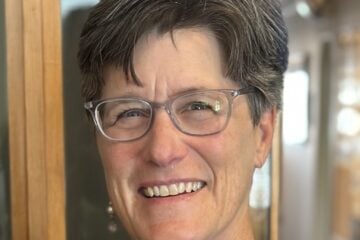John Wilson, former chief programmer for PBS and SVP for WETA, dies at 62

Wilson
John F. Wilson, a programming executive who helped shape public TV’s national schedule through leadership positions at PBS and WETA in Washington, D.C., died Nov. 24 at his home. He was 62.

Wilson was diagnosed with cancer last year and had been dealing with the aftermath of brain surgery, according to a staff memo from WETA CEO Sharon Percy Rockefeller. At the time of his death, Wilson was the station’s SVP and chief national content officer.
“John, who contributed so much to the success of public media, leaves us an extraordinary legacy within the stellar content he shepherded in service to the public,” Rockefeller said in the memo. “We even more so will cherish memories of the time we had together with John — a beloved, trusted, and kind colleague to so many at WETA, PBS, and beyond.”
“John devoted nearly all of his professional life to public television,” said PBS President Paula Kerger in a statement. “We’re grateful for his many accomplishments during his two decades at PBS and his continued partnership more recently at WETA.”
At WETA and PBS, Wilson collaborated with public television’s top producing talents, including Ken Burns and Henry Louis Gates Jr.
Wilson “was funny, loving and a complete joy to work with,” Burns said in a statement. He had “a singular focus on storytelling and the importance of public media. He understood more than most — and throughout his entire career — that people are excited about smart, engaging stories that introduced them to history, my area, but equally the arts and science. … ”
Gates also remembers Wilson fondly as the PBS executive who helped launch his filmmaking career.
“John was actually the very first person at PBS I ever met,” Gates said in a statement. “I had absolutely no idea how to do an outline, a treatment, or even mount a production! I was by myself. I just had an instinct that public television and I might have a future, an instinct that John not only shared but encouraged. … ”
Up and comer from Arizona PBS
Wilson was born Aug. 13, 1962 and grew up on a farm in Marengo, Ill., about sixty miles northwest of Chicago. He graduated from Arizona State University and began working at its public TV station, Arizona PBS, then known by its call letters KAET, in 1983.
After jobs as an EP and writer, he moved into programming. When he left in 1994, Wilson was PD and had consulted with PBS on fundraising programs for two years. That fall, he joined PBS as director of scheduling and planning. He was promoted from that job to senior director and, later, VP of program scheduling and editorial management in the late 1990s.
In 2000, when Wilson was 38, then-PBS President Pat Mitchell appointed him SVP and co-chief programming executive alongside Jacoba Atlas, a producer who had worked with Mitchell at CNN. While the pair collaborated to respond to PBS’ declining cume ratings and support producers’ new ideas, Wilson focused on PBS Kids, he said in a 2004 interview with Current.
Shawn Halford, EVP of content and VP of exchange and digital services for American Public Television, worked with Wilson at PBS for many years, starting in 1997. Wilson loved children’s programming and drew inspiration from his own growing family, he said.
“I got to see John as a parent at the same time that he was working on all these kids projects,” Halford said. “I think it was such a personal thing for him to serve kids through the content because he saw it in action with his own family.”
Children’s series that Wilson oversaw at PBS included Cyberchase, Dragon Tales, Clifford the Big Red Dog and Curious George. He also led development and launch of a weekend block of animated children’s programs.
Among the award-winning primetime series Wilson developed for PBS were Gates’ Finding Your Roots, now one of the most-watched PBS shows, and Burns’ The National Parks: America’s Best Idea.
In 2005, Wilson took over the job of PBS’ sole chief programming executive, and he remained in that role until 2012. Under a restructuring initiated by PBS President Paula Kerger, Wilson became SVP of pledge strategy and special projects. In early 2014, Wilson left PBS.
In his chief programming roles at PBS, Wilson navigated political challenges both inside and outside of public television. In addition to developing and pitching new strategies for attracting and holding on to viewers, corporate sponsors and pledge-drive contributors, PBS leadership had to deal with pressures from conservatives and liberals over its programming.
Wilson weathered these challenges with a self-deprecating humor that put his colleagues at ease, Halford said. He described his former boss as well-read, ambitious, jovial and adept at drawing on his wide-ranging interests to make program decisions. He said Wilson had the foresight to help distribute programs like Gormenghast, a fantasy series from 2000 that was based on novels by Mervyn Peake and starred Jonathan Rhys Meyers.
“That was a passion project that he worked with GBH and the British producers on,” Halford said. “He brought this thing that was years ahead of Game of Thrones, minus the dragons and the nudity, but still in that same territory. It was groundbreaking and had heavy production values.”
Transition to WETA
After leaving PBS, Wilson led his own consulting firm and became a senior consultant for AARP. He eventually joined the association as a VP in charge of its Life Reimagined Institute. In 2019, Wilson joined WETA’s executive team as VP of project management. Later that year, he was promoted to SVP and chief national content officer.
Wilson oversaw WETA’s productions of The Kennedy Center Mark Twain Prize for American Humor, The Library of Congress Gershwin Prize for Popular Song, and the 2021 special Spirit of the Season: In Performance at the White House.
Jim Corbley, VP of production management for WETA, recalled being struck by Wilson’s intellect and knowledge on a variety of subjects. “But he didn’t come across as superior or elitist,” Corbley said. “He was the most approachable and friendly guy. He’d give you the shirt off his back. It was an honor to get to know him and a pleasure to work with him.”
Wilson loved music and collecting guitars. He also enjoyed burning Christmas CDs for colleagues. Corbley remembered discovering an album by the jazz guitarist Joe Pass and thinking he’d turn Wilson onto music he wasn’t familiar with, but Wilson had already heard it.
Wilson also became a huge fan of the Washington Nationals, Corbley recalled. He was ecstatic in 2019 when the team defeated the Houston Astros in seven games to win the World Series.
Kate Kelly, senior director of national project management for WETA, said Wilson enjoyed traveling with his family, particularly to a cabin at Big Bend Farm in Millboro, Va., and also to the Deer Canyon in Antelope Valley in Arizona.
Wilson is survived by his wife Melissa and their children Cody and Jack.






I’m truly saddened to lose John. He was our main champion of programs, inspiration and strength while at PBS. He was not one of the good guys, he was a truly one of the great guys and programmer who understood the balance of on-air fundraising, mission and synergy. He understood the need to spend money to promote programs outside of PBS to bring the audience into our files and how to bring our content into the national press. John was a great friend and inspiration who truly understood from the trenches how to support a real producer/network relationship and to share knowledge and collaboration. Plus many great laughs and some of the best advice I’ve ever gotten as we built into our own distribution model for stations.. Thank you John for all you did. We would not have built the success we’ve had without you. I’ll miss you much my pal.
John Wilson’s passing is an incredible loss to our public television system. He was so thoughtful, creative, kind and especially known for his dry wit that was unmatched. John also had an uncanny sixth sense about programming and people. I count myself as one of the lucky ones to have known and worked with John. Gone way too early, John left us a great legacy in all the productions he inspired and executed – we will miss him dearly.
So very sorry to hear this. What I remember most is John’s sly humor. However high he rose in the ranks, he would introduce himself as “I’m John Wilson, and I work in Programming.” Good guy, with a huge influence on the national lineup that continues to this day.
David, your comment about how John introduced himself made me chuckle. John was the youngest of six. When I sent this article to all of them, their universal reaction was “This is what he did? We had no idea!”
He was a guy who never wanted to “get above his raisin’ “ but he absolutes loved his job and he adored working at WETA. Thanks for your kind comments.
John was a classic and an original neatly intertwined: kind, generous, truthful, and supportive… and always spot on with his ideas and creative approach. He was a huge supporter of my work, and the partnership we forged bringing the series CARRIER to PBS audiences began our many years of collaboration and an example of his continual energy for his role in creating and forwarding meaningful programs in the system. John was a friend and mentor and helped our company, Show of Force, make its mark. Thinking about his stamp on PBS… I think of his sly wit and casual mid-western roots, which defined his style. Missing John and all that he brought to his life, his family, his friends, and his colleagues… is something that will always remain.
I was very sorry to hear of John’s passing. John and Coby Atlas were very helpful to me with national shows of that time. I lived in Park City and always enjoyed John’s visits to Sundance. All my best wishes to Melissa and family.
I am grieved to hear of John’s passing. When I arrived at PBS HQ in 2008, I worked the night shift. But even with no one in the building, it didn’t take long to learn about John and the difference he was making. I gained a great respect for him and followed his career. I rejoiced to see when he got back to PBS at WETA. His work fulfilled what our Public Broadcasting Service was envisioned to be, a place where its viewers were educated, informed, and most of all, inspired. John was the best at what everyone born should always aspire to be—a true public servant.
I have been thinking about John and the legacy he leaves a caring, compassionate person who gave more than required and always with kindness and grace. He was a friend to me when I was at our small, rural PBS station with big ideas about national programming. He took the time to help, support and build relationships with all stations. He is truly gone too soon and will be missed greatly by his public television family.
I just learned of both John ‘s successful career and his untimely passing. We were in high school together, although a few years apart. I am going to what would have been his 45th class reunion tomorrow and John was one of the people I most hoped to see. I am sorry I missed the opportunity to know him as an adult. The obituary and recollections above show that the young fellow that I liked and respected grew into a great man.